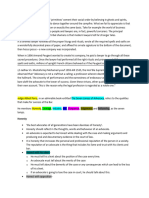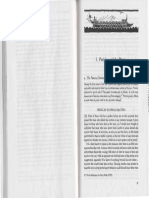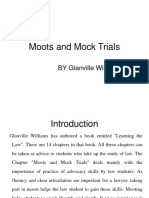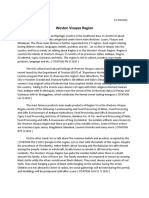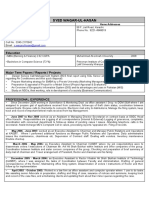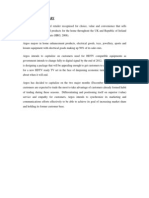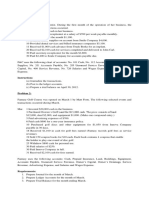0 ratings0% found this document useful (0 votes)
18 views7 Lamps of Advocacy
7 Lamps of Advocacy
Uploaded by
aditrichaturvedi722The document discusses the seven lamps of advocacy which are qualities an advocate should possess. They are honesty, courage, industry, wit, eloquence, judgment, and fellowship. It also discusses an additional eighth quality of an advocate - tact.
Copyright:
© All Rights Reserved
Available Formats
Download as PDF, TXT or read online from Scribd
7 Lamps of Advocacy
7 Lamps of Advocacy
Uploaded by
aditrichaturvedi7220 ratings0% found this document useful (0 votes)
18 views3 pagesThe document discusses the seven lamps of advocacy which are qualities an advocate should possess. They are honesty, courage, industry, wit, eloquence, judgment, and fellowship. It also discusses an additional eighth quality of an advocate - tact.
Original Title
7 lamps of Advocacy
Copyright
© © All Rights Reserved
Available Formats
PDF, TXT or read online from Scribd
Share this document
Did you find this document useful?
Is this content inappropriate?
The document discusses the seven lamps of advocacy which are qualities an advocate should possess. They are honesty, courage, industry, wit, eloquence, judgment, and fellowship. It also discusses an additional eighth quality of an advocate - tact.
Copyright:
© All Rights Reserved
Available Formats
Download as PDF, TXT or read online from Scribd
Download as pdf or txt
0 ratings0% found this document useful (0 votes)
18 views3 pages7 Lamps of Advocacy
7 Lamps of Advocacy
Uploaded by
aditrichaturvedi722The document discusses the seven lamps of advocacy which are qualities an advocate should possess. They are honesty, courage, industry, wit, eloquence, judgment, and fellowship. It also discusses an additional eighth quality of an advocate - tact.
Copyright:
© All Rights Reserved
Available Formats
Download as PDF, TXT or read online from Scribd
Download as pdf or txt
You are on page 1of 3
.
I Eth"1cs, Accountancy for Lawyers & Bar-Bench Relation
38 Profess1ona
i
4. SEVEN LAMPS OF ADVOCACY
Lord Brougham said. that a 'lawyer ri:ust, know everythin
about something and something about ~V:erythmg. A_good advocat
should possess some essential quahties and equipment. Judg
Abbot Parry in his book entitled, 'The Seven Lamps of Advocac:y
refers to the qualities, which an. advocate should p~ssess~ The
are:
I. Honesty 2. Courage. 3. Industry. 4. Wit. 5. Eloquenc
6. Judgment; and 7. Fellowship.
1. Honesty: Honesty means the -. quality .. o
straightforwardness; freedom from deceit, cheating o
s"iealing and not telling lies. The. best advocates of al
generations have been devotees of honesty. Example fo
honest character is Abraham Lincoln, who founded hi
-fame and success on what some called 'perverse honesty'
The nobleness of legal p~ofession ,lie.~ in .honesty
- . . .,
' .
itself.
He should disclose the real facts .and legal- po~ition t
his clients frankly. Hon~sty, integrity and character are.
inseparable. These three virtues together ·are essentia
or the success of an advocate. •, - •
. .
urage: Courage is -the quality. that enables a perso
£Ontrol fear in the face of danger, pain, misfortune,
__An_ advocate should. (ace the pressures from outsi.9e
coura e. metimes he has to fight against State.
hould pot fear about the executive and politiciaJlS.
ust perform his duty to safeguard the. interests of
ient. _Advocacy is a f~rm of combat \\;'here courage
fa~e of danger· means ~innirig µalf the battle.
e 1s as g~od a weapon in the forum as in •the
les Hutton's. He hath in perfection the three
• - & ~. . . .
I
lifications of an advocate - Boldness Boldness
'll~~~l~mp .quotes 'the dry drud~~ry of the
ead~o~d.- A~vocacy is indeed a life ·of industry
wyer ~ust _study his _brief in the same way that
r studies his part. Success in advocacy is not
Advocacy: A Noble Profession 39
derived at by intuition. Lord Eldon says, 'An advocate
must live like a hermit and work like a horse'. Advocacy
is an intellectuaJ_ profession. Intelligence and knowlcd e
w1 be sharpened wit·-h-aidwor. a~d strenuous efforts.
_Advocacy is the profession, which rcq·ui~c 'study' and
'study' throughout the career. Industry brings a good
fame and .name to an advocat~.. IJaw changes day-to-
day. T'o ace uire u Jtodatc knowledge an advocate 1nust
refer international and national 1ouma s, re erence oo s
of his library and the bar library. 1-Ic has to work hard
like a spider to the P~rn;,fA\ of his ,client. 1 .. .,.,.., .._/~
. w· 1rJ.eU,~~ ,n tA f'vU.lff Wl • rYl.MlfJp1
•4 . .W
, 1t:_ 1t means clever anti humorous expression of '-1
jdeas; liveliness of spirit. Wit flows from intelligenc~--
"
understanding and quickness of mind. Wit lessens the
workload of an advocate. It relaxes his mental strain.
The lan1p of wit is needed 'to lighten the darkness of
advocacy. Often the wit of a lawyer will tum a Judge
from an unwise course, where judg1nent or rhetoric would
certainly fail.'
5. Eloquence: The success of an advocate depends upon
his eloquence. Eloquence mea1!s fluent speaking and
s. kilful
. u,se of 1gRfl]Jegy to ~ersuade or to appeal to the
feeling ·of others. Fluent- speaking impresses the listener.
An advocate must be fluent, skilful in using appropriate
words to impress the Court. Eloquence attr?cts the
attention of the listener. Eloqu~fice is related 10 the art _
of oratory. . 'Eloquence of manner is real eloquence'
and there is a physical as well as psychological side to
advocacy. 4/ ·Lu Iv tuf!SeL . ,• .
6. Judgment: Judgment"il an intellectual capacity~· 'the
inspiration which enables a min to translate gobdl\nsc
into right action'. In judgment one has to estin1atc,.
.9on&ider and form an opinion about the issues with good
• sense and ~bili.ty;. An advoca~e could be In a positi~n. to
Judge the merits and demerits of the -case on hearing
the brief a~d seeing the document. He s·hould inf<)rm his
client the legal position openly after judging the issue~.
Professional
,40 ~~ Ethics, Acco for Lawyers
untancy:=: Relation -
& Bar-Bench---
~~ ~~ ~.. .::: .:= ~-- --= --- --- ---
/=-
Here judgment is not 'givi ng the deci sion of the case
by the Judge in the.C ourt '. !~d ~en t mea ns the st~
of the case in deep by ~ons1der1ng all shad es of the
consequences. In nothing does the lawy er mor e openly
exhibit want of Judgment than in prolixity.
7. Fellowship: Fellowship means the mem bers hip in friendly
association or companionship .. Fello wshi p is e x a ~ ·
a great public school, the boys of whic h have grown
older, and have exchanged boyi sh for man ly objects.
Though the advocates are oppo nent parti es befo re the
bench but not enemies with each othe r their conf lict ends
as they come out of the doorsteps of the Cou rt. Daniel
Webster says, 'La:wyers .Q!! oppo site side s of a case are
like the two parts of shears, they cut wha t com es
betw een them, but not each othe r'. The re is n~
discrimination of age, ability, expe rienc e and riche s etc.
between the advocates. All are equal. By keep ing the
lamp of fellowship burning, adyo cates enco urag e each
_other by sharing the knowledge to walk in the lig} rtof
the seven lamps of advocacy.
In_ add~tion_ to the ab~ve seven, K. V. Kris hna Swa my
Aiyer m his book entitled, 'Prof essio nal Con duct and
:'"dvo~acy' adds~includes one ffiore qual ity of an Advocate,
S~ t as the eighth lamp as explained belo w:
It is not feasy to _des
th cribe tact but its
b - 'fac~is,.(as ~ lan_ip):ed Men .
a sence easily notic
suffered for quarrelling wi~h the tr·~ u~qu estio ned ~bili ty ha~e
1
dignity over trifles ti tt· . un~ or for stan dmg on the1r
their
tempers; they are 'me~rg;f m!rt~he~r ch~nts, or for losin g
handling peo le an • - p ut with out tact. _Tact means
.. t cau • ffence.
_ n a vocate must be in a
lient
opponent part o anent ods1t10n to tackle and hwin .
• a vocate in a smo ot er wa . _An
a vocate should not quarrel with C
t mgs m e ourt and out 'd ourt _or lose tern er over trifle
founded on judg men t but • si e. - Tact mvo lves and is in reality
0f • • more prop erly re £ers to the hum an side .
puttmg mto actio n the
resu1t of one' s judg men t.
You might also like
- IEM PI 0100 - Competency Model For PI Oral InterviewDocument6 pagesIEM PI 0100 - Competency Model For PI Oral InterviewJani AceNo ratings yet
- Cockney Dialect and SlangDocument28 pagesCockney Dialect and SlangPaula Perez100% (1)
- Seven Lamps of AdvocacyDocument11 pagesSeven Lamps of AdvocacyZap 24kNo ratings yet
- Professional Ethics 7lampsDocument7 pagesProfessional Ethics 7lampsCharlie PushparajNo ratings yet
- Seven Lamps of Advocacy PDFDocument3 pagesSeven Lamps of Advocacy PDFkunal mehtoNo ratings yet
- 4-Equipments - 7 LampsDocument26 pages4-Equipments - 7 Lampssharvi sharmaNo ratings yet
- 7 Lamps of AdvocacyDocument4 pages7 Lamps of Advocacydixitanupam696No ratings yet
- Seven Lamps of AdvocacyDocument1 pageSeven Lamps of AdvocacyAnuraag ChanakyanNo ratings yet
- Seven Lamps of AdvocacyDocument3 pagesSeven Lamps of AdvocacySarthak patelNo ratings yet
- The 7 Lamps of AdvocacyDocument1 pageThe 7 Lamps of AdvocacynabihahNo ratings yet
- 7 Lambs of Advocacy PDFDocument2 pages7 Lambs of Advocacy PDFRaaja velNo ratings yet
- Seven Lamps of Advocacy-1Document12 pagesSeven Lamps of Advocacy-1ShohanNo ratings yet
- Seven Lamps of AdvocacyDocument4 pagesSeven Lamps of Advocacymeghana100% (4)
- 7 Lamps of AdvocacyDocument2 pages7 Lamps of AdvocacyDevesh SawantNo ratings yet
- Sumbitted To: Submitted By:: Even Lamps OF AdvocacyDocument6 pagesSumbitted To: Submitted By:: Even Lamps OF Advocacyudita goelNo ratings yet
- 7 Lamps of Advocacy1Document6 pages7 Lamps of Advocacy1Nagendra Muniyappa100% (1)
- PhiLaw Chapter-3 2Document8 pagesPhiLaw Chapter-3 2Jessa Ervina Badion-GerillaNo ratings yet
- The Five Functions of The Lawyer PDFDocument6 pagesThe Five Functions of The Lawyer PDFRiza AkkangNo ratings yet
- Pe Assignment 2 HimanshuDocument9 pagesPe Assignment 2 Himanshuhimanshuchauhan1702935No ratings yet
- Legal-Counseling CompressDocument14 pagesLegal-Counseling CompressLadybird MngtNo ratings yet
- Professional Conduct And AdvocacyDocument28 pagesProfessional Conduct And AdvocacynaveengamerytNo ratings yet
- The-Art-Of-Advocacy Ba LLBDocument27 pagesThe-Art-Of-Advocacy Ba LLBYashasviniNo ratings yet
- Legal CounselingDocument14 pagesLegal CounselingMa BelleNo ratings yet
- Lamps of Legal ProfessionDocument19 pagesLamps of Legal ProfessionAkarshan SrivastavaNo ratings yet
- Advocacy As An Art: Dinesh VermaDocument4 pagesAdvocacy As An Art: Dinesh VermaSunil SahuNo ratings yet
- Seven Lamps of AdvocacyDocument16 pagesSeven Lamps of AdvocacyaviyanagroupNo ratings yet
- Types of Primary Sources:: ConstitutionDocument10 pagesTypes of Primary Sources:: Constitutionramya xNo ratings yet
- Cross Examination TipsDocument17 pagesCross Examination TipssiggiveromierNo ratings yet
- Grice's Maxims and The Principle of Selectiveness: An Advertising Language Perspective. Fu Jen StudiesDocument20 pagesGrice's Maxims and The Principle of Selectiveness: An Advertising Language Perspective. Fu Jen StudiesMuhammad AsyhariNo ratings yet
- C 50 Maritime Arbitration Expert WitnessDocument7 pagesC 50 Maritime Arbitration Expert WitnessΑθανασιος ΜπεργελεςNo ratings yet
- Serven Lamps of AdvocacyDocument9 pagesServen Lamps of AdvocacyAkankshaNo ratings yet
- Excerpts: The Seven Lamps of Advocacy by Edward Abbott ParryDocument13 pagesExcerpts: The Seven Lamps of Advocacy by Edward Abbott Parryshailja singhNo ratings yet
- Seven Lamps of AdvocacyDocument4 pagesSeven Lamps of AdvocacyMagesh Vaiyapuri100% (1)
- Advocate and Advocacy: Rule 47 of Chapter II Not Personally Engage in Any BusinessDocument29 pagesAdvocate and Advocacy: Rule 47 of Chapter II Not Personally Engage in Any BusinessHarsh SinhaNo ratings yet
- TBS Advocacy For LawyersDocument17 pagesTBS Advocacy For LawyersE- 48- Pramod KediaNo ratings yet
- Key Facts Equity Trusts 3rd Edition Chris TurnerDocument84 pagesKey Facts Equity Trusts 3rd Edition Chris TurnerandionuuotguNo ratings yet
- Duncan & Kooperud 2008Document30 pagesDuncan & Kooperud 2008starjo24No ratings yet
- Seven Lamps of Advocacy PDFDocument1 pageSeven Lamps of Advocacy PDFVishal AnandNo ratings yet
- Ravi Arora, Final Draft, Nonverbal CommunicationDocument35 pagesRavi Arora, Final Draft, Nonverbal CommunicationVijay AroraNo ratings yet
- Critical Thinking in Essay WritingDocument7 pagesCritical Thinking in Essay Writingafibaixzyhpqmc100% (2)
- May 1997 aBTl Report 0001Document3 pagesMay 1997 aBTl Report 0001tommcdeNo ratings yet
- Excerpts: The Seven Lamps of Advocacy by Edward Abbott ParryDocument13 pagesExcerpts: The Seven Lamps of Advocacy by Edward Abbott ParryJ DebosmitaNo ratings yet
- BABCOCK - Defending The GuiltyDocument15 pagesBABCOCK - Defending The GuiltyLucas MirandaNo ratings yet
- Onimisi's Care, Volume 4.1 (Env. Law) .Document342 pagesOnimisi's Care, Volume 4.1 (Env. Law) .jakadaduwaNo ratings yet
- Latin WordsDocument34 pagesLatin WordsHarold ZunguNo ratings yet
- Annotation The Attorney in Court PracticeDocument10 pagesAnnotation The Attorney in Court PracticeKrisia OrenseNo ratings yet
- Forensic PDFDocument17 pagesForensic PDFMay ToyokenNo ratings yet
- Woodruff Thucydides On Justice Power and Human Nature Pp.39 58Document12 pagesWoodruff Thucydides On Justice Power and Human Nature Pp.39 58Emily FaireyNo ratings yet
- Compiled Doc For Ethics 2Document130 pagesCompiled Doc For Ethics 2Shubham PhophaliaNo ratings yet
- Truppenführung Translation by United States ArmyDocument71 pagesTruppenführung Translation by United States Armydavid sarmientoNo ratings yet
- Moots and Mock TrialsDocument21 pagesMoots and Mock TrialsDhaarani SekarNo ratings yet
- External Aids... Book Prof T BhattacharyaDocument9 pagesExternal Aids... Book Prof T BhattacharyaKhushi SalujaNo ratings yet
- Fallacy Part 1Document6 pagesFallacy Part 1Tyler SmithNo ratings yet
- Examining WitnessesDocument258 pagesExamining WitnessesRubenNo ratings yet
- Attorney Admits Foreclosure Defense Always FailsDocument6 pagesAttorney Admits Foreclosure Defense Always FailsBob HurtNo ratings yet
- Aristotle Rhetoric Reading NotesDocument7 pagesAristotle Rhetoric Reading NotesGregory ZobelNo ratings yet
- Ehrlich - Lost Art of Cross ExaminationDocument193 pagesEhrlich - Lost Art of Cross Examinationhdshsd3443No ratings yet
- UntitledDocument136 pagesUntitledjurebieNo ratings yet
- Fit Proper Practitioner - CompressedDocument4 pagesFit Proper Practitioner - Compressedsimon nguenaNo ratings yet
- Art of AdvocacyDocument5 pagesArt of AdvocacyUPES 3495No ratings yet
- Summary of Gary A. Klein's Sources of Power, 20th Anniversary EditionFrom EverandSummary of Gary A. Klein's Sources of Power, 20th Anniversary EditionNo ratings yet
- Huan UCSPDocument3 pagesHuan UCSPSimplicio Gadugdug VNo ratings yet
- Republic Act No. 10607 Section 1. Presidential Decree No. 612, AsDocument31 pagesRepublic Act No. 10607 Section 1. Presidential Decree No. 612, AsHiroshi CarlosNo ratings yet
- Biography of Gustavo Adolfo BécquerDocument1 pageBiography of Gustavo Adolfo BécquerScribdTranslationsNo ratings yet
- Assetsguidesshaw Festival Study Guide Devils Disciple PDFDocument39 pagesAssetsguidesshaw Festival Study Guide Devils Disciple PDFtinjalaerikaNo ratings yet
- Evolution of Management Theories - An IntroductionDocument10 pagesEvolution of Management Theories - An IntroductionGeorge SilandoteNo ratings yet
- Freight Forwarding SoftwareDocument21 pagesFreight Forwarding SoftwareDeevakar VermaNo ratings yet
- IZZ IR Ilot Ecruitment Andidate S Andbook: W A P R C ' HDocument15 pagesIZZ IR Ilot Ecruitment Andidate S Andbook: W A P R C ' HAndry BlackNo ratings yet
- Brown, C. and Vessey, I. (2003)Document14 pagesBrown, C. and Vessey, I. (2003)Σοφία ΝικολάουNo ratings yet
- Bayanihan Activity DesignDocument3 pagesBayanihan Activity DesignNicole UyNo ratings yet
- Arata IsozakiDocument6 pagesArata IsozakiaryaNo ratings yet
- A Practical Guide To Fares and TicketingDocument449 pagesA Practical Guide To Fares and TicketingErmiyas AlemayehuNo ratings yet
- Lock Box File2Document5 pagesLock Box File2SATYANARAYANA MOTAMARRINo ratings yet
- RME MARKING SCHEME MARCH 2024 Docx 1710101728500Document7 pagesRME MARKING SCHEME MARCH 2024 Docx 1710101728500bobten190No ratings yet
- Baudouin Marine Product Guide 2024Document37 pagesBaudouin Marine Product Guide 2024pmknl0489No ratings yet
- Syed Waqar-Ul-Hasan: EducationDocument2 pagesSyed Waqar-Ul-Hasan: EducationIrfan RazaNo ratings yet
- Towards Stateless Democracy: Ideological Foundations of Rojava Autonomy and The Kurdish Movement in TurkeyDocument61 pagesTowards Stateless Democracy: Ideological Foundations of Rojava Autonomy and The Kurdish Movement in TurkeyFrancisco Oneto NunesNo ratings yet
- Uy Vs ContrerasDocument1 pageUy Vs Contrerasmamp05No ratings yet
- Latest 1Z0-819 Exam Questions and Verified AnswersDocument2 pagesLatest 1Z0-819 Exam Questions and Verified AnswersjohnjackmicheleNo ratings yet
- European and International Business Law LLM 20160519 2035Document67 pagesEuropean and International Business Law LLM 20160519 2035dediosemily08No ratings yet
- Human Settlements CUET Geography CH 10 - 240722 - 232337Document16 pagesHuman Settlements CUET Geography CH 10 - 240722 - 232337Aayush PatelNo ratings yet
- VII. Choose The Options That Best Fit The BlanksDocument2 pagesVII. Choose The Options That Best Fit The BlanksNgocthuy DinhNo ratings yet
- Marketing Plan For ArgosDocument21 pagesMarketing Plan For Argosleye02100% (5)
- Answer Key Week 3Document14 pagesAnswer Key Week 3Luigi Enderez Balucan100% (2)
- Shivani ResumeDocument2 pagesShivani ResumeshivaniNo ratings yet
- Coordinate Geometry DrillsDocument30 pagesCoordinate Geometry DrillsManav MakwanaNo ratings yet
- Journal ClassDocument1 pageJournal ClassKhondokar ShantoNo ratings yet
- Cara Mengatasi - This Program Is Blocked by Group PolicyDocument20 pagesCara Mengatasi - This Program Is Blocked by Group Policyarif vionoNo ratings yet
- The Mountain of The LordDocument9 pagesThe Mountain of The LordgezedkaNo ratings yet






